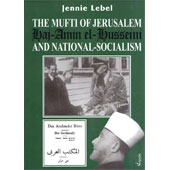THE MUFTI OF JERUSALEM HAJ-AMIN EL-HUSSEINI AND NATIONAL-SOCIALISM - Ženi Lebl
- Za kupce iz Srbije važeća cena je u RSD
- Za kupce iz inostranstva važeća cena je EUR / US$
- Pisac / Autor
For a long time there were no nationalist movements in the Middle East, in the territory of the Ottoman Empire, known as the Fertile Crescent from the Moslem symbol. The Sultan was also the Caliph, the religious and secular leader of all Moslems, considered to be Prophet Muhammad's legal heir. Nationalist movements arose only here and there, and their aim was not the dissolution of the Empire, but some kind of autonomy.
A negligible minority with significant political power consisted of effendis, rulers who did not live on their possessions. The majority of the population was divided into clans and tribes. They were totally devoid of rights, poor and illiterate falahs who made a living from slave labour for the effendis or from cultivating a barren and meagre plot of earth.
Until the middle of the 19th century, Jerusalem was only a vilayet, one of many Ottoman provinces. The Mufti of Jerusalem was subordinate to the qadi (judge) in the ulema, the hierarchy of the Ottoman Empire. Qadis were nominated by the central authorities and received their salary directly from the state treasury, while the Mufti lived from an honorarium, which depended on the number of fatwas proclaimed by him. However, while the qadi remained at his post for about a year, the mufti stayed in office much longer, mostly for life, supported by his relatives - according to the unwritten laws of nepotism, the protectionist manning and misuse of lucrative and high positions.
In the course of secularisation in the Ottoman Empire from the beginning of the 19th century, the legal authority was one the first victims which emerged. At the same time Jerusalem became an important point connected to Istanbul, and this enhanced the reputation and influence of the muftis of Jerusalem.
pismo: engleski jezik
strana: 374
format: B5
povez: tvrd






Pošaljite Vaš komentar / Ocenite ovaj artikal